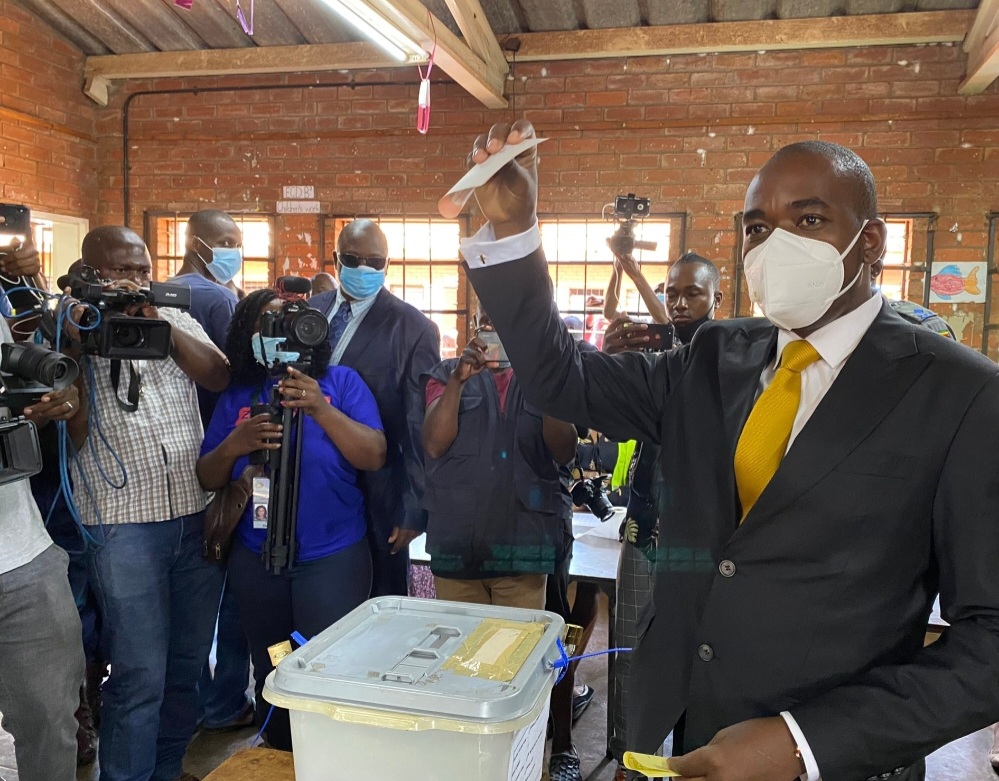BY GODFREY YORK AND JEFFREY MOYO
Zimbabwe’s main opposition party, defying a police campaign to shut down its rallies, has won a majority of seats in much-anticipated by-elections that were seen as a key test of its strength.
The sweep by the opposition party, the Citizens Coalition for Change, or CCC, shows it will remain a threat to the ruling party, Zanu PF, which has dominated the country for more than four decades since its independence.
The CCC won 19 of the 28 seats in the Saturday by-elections, in which about 10 percent of parliamentary seats were at stake. It also won a majority of local council seats in the by-elections, according to preliminary results released on Sunday.
The much-delayed by-elections, originally scheduled for 2020, were a crucial challenge for opposition leader Nelson Chamisa after years of official pressure against him.
He will make another bid for power in national elections next year. But his supporters have faced frequent harassment and intimidation tactics from the government and police.
Vice president Constantino Chiwenga compared the opposition to insects that must be destroyed.
“You see how we crush lice with a stone,” he told a rally of the ruling party last month.
“That is what we are going to do to the CCC.”
President Emmerson Mnangagwa, in his final rally before the by-elections, vowed that his party “will rule forever.”
His predecessor in the ruling party, Robert Mugabe, had remained in power for 37 years until he was toppled in a military coup in 2017.
In the lead-up to the by-elections, Zimbabwean police had banned several of the opposition party’s rallies and arrested dozens of its supporters.
At campaign rallies, several opposition supporters were killed or injured by suspected Zanu PF supporters.
Chamisa said the Zimbabwe Electoral Commission was clearly biased in favour of the ruling party.
He said the commission had refused to allow the opposition to exercise its legal right to inspect the registry of voters.
State media largely ignored or denigrated the opposition, despite laws requiring fair coverage.
Until this year, Chamisa’s opposition party was known as the Movement for Democratic Change, or MDC – but he was forced to create a new party in January after a series of controversial court rulings that allowed a small breakaway faction to take control of the party.
The faction then expelled dozens of opposition MPs from parliament in 2020 and 2021, leaving vacancies that lasted until the by-elections this past weekend.
Many analysts said the ruling party had covertly supported the factional manoeuvring and court rulings in an attempt to weaken the opposition by dividing the MDC.
Mnangagwa denied the allegation.
On election day, some Zimbabweans said they were turned away from polling stations because their names were not on the official registry.
“I’m supposed to vote here, but I have just been told that my name is not on the voters’ roll,” said Melvin Gombiro, a 27-year-old CCC supporter who was turned away from a voting station in Mabelreign, a Harare suburb.
“Rigging is under way, and I know Zanu PF wants to steal this election,” he told The Globe and Mail.
Chamisa, in an interview with The Globe, said the government is violating Zimbabwe’s constitution by persecuting the opposition and manipulating the election.
“They ban us because they are afraid of what a free and liberated citizenry will mean for their authoritarian rule,” he said.
“Because Zanu PF is unpopular, it resorts to violence and intimidation,” Chamisa added.
“We need to win big, by wide margins and with a landslide, to avoid the vote being manipulated.”
Despite the threats of violence or arrest, thousands of Zimbabweans still flocked to the opposition party’s campaign rallies.
Many were angered by the deteriorating economy, widespread poverty and unemployment, and the collapse of the national currency.
“I want change,” said Luke Chibvuri, a 36-year-old motor mechanic. “I am struggling. I get paid peanuts at work.”
He said he was worried that the police would disrupt the rally, but he still arrived early at the CCC’s final election rally in Epworth, on the outskirts of Harare.
Opposition activists accused the government of sending armed riot police to opposition strongholds to deter people from attending CCC rallies.
“They’re creating an environment of fear, trying to scare people away from our rallies,” said Happymore Chidziva, a senior official in the party.
“They make it appear as if there’s a war. They intimidate people.”
Despite the CCC victories in a majority of the by-election seats, observers cautioned that the party could struggle in next year’s national election.
The opposition still has significant weaknesses in rural areas, where Zanu PF remains strong.
“Many of the rural communities depend on the state-controlled media, and this has been detrimental to the opposition,” said Rashweat Mukundu, a Zimbabwean political analyst. – The Globe and Mail

 Slider3 years ago
Slider3 years ago
 National4 years ago
National4 years ago
 Tourism and Environment4 years ago
Tourism and Environment4 years ago
 Opinion4 years ago
Opinion4 years ago
 Special reports4 years ago
Special reports4 years ago
 National4 years ago
National4 years ago
 National3 years ago
National3 years ago
 National3 years ago
National3 years ago



